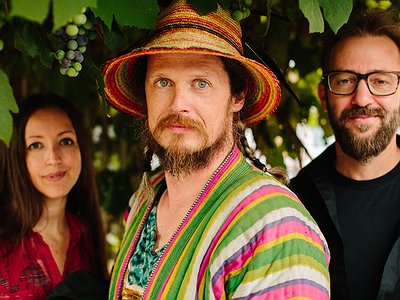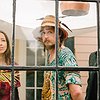Part 1
Name: Arrington De Dionyso of Old Time Relijun
Nationality: American
Occupation: musician
Current Release: Musicking on K Records
Recommendations: Senyawa’s latest album Alkisah points to a future of music distribution that nobody in history has ever before considered before now because there are at least fifty different versions of the album. Every unique release is a collaboration with a different community or network of exchange in which the context of the creative “product” becomes more like a living thing that reproduces in its own ecosystem. It’s not that the music is “the best” album or anything like that, it’s that it is demanding we adapt to a completely new understanding of how we should share a recording of our music. / For painting, please follow the social media of Love Leonce and his collective Timouns Rezistans in Port au Prince, Haiti. We will be collaborating on some new projects together very soon.
If you enjoyed this interview with you can check in with the band on oldtimerelijun.bandcamp.com/album/musicking and https://www.facebook.com/OldTimeRelijun
When did you start writing/producing music - and what or who were your early passions and influences? What was it about music and/or sound that drew you to it?
I remember being two years old and sneaking up to the pulpit after incredibly boring church services (my father was the minister!), I would walk right up to the church organ and start pounding away on the keys because I heard the most incredible music inside my head. All the notes had different stories to tell, about dragons and animals dancing around making fire. The adults thought it sounded horrible. So, I wasn’t given a lot of help with my own music at first. I loved making strange sounds with my voice, I could imitate any imaginary creature and that is how I discovered throat singing, obviously it’s the same sound a dragon makes. The shamans in Tuva know this too.
As a youth I got involved in theatre. It was a special program for children’s theatre but it actually introduced us to a lot of very “experimental” concepts, it was quite a daring program in the 1980s. They would never let children do this program today, everybody would be afraid because we did work to really delve deep into the secret powers accessed by actors throughout the ages.
When my family moved to a different city there was no more program for theatre but I was able to translate the same skills into creating the “character” of a rock star. Actually, I learned some guitar and started writing my first songs at 13. I immediately started singing and playing on the streets for money, so I made cassette tapes to sell to anyone interested- always $5 each. At first the tapes were just acoustic guitar and screaming, but when I bought a four track I made some drum sounds out of upside-down trashcans, or gongs out of popcorn bowls. I added some bass, and later I learned some clarinet, some flute to make crazy sounds.
Listening to Captain Beefheart at a very young age probably destroyed my brain but I only wanted to create my “own” sound, I didn’t want to sound like anybody else. I went to hardcore shows every weekend, and listened to music from Africa, Asia, indigenous music from anywhere- at the library. I wanted to destroy all “Western” music and start over.
For most artists, originality is preceded by a phase of learning and, often, emulating others. What was this like for you: How would you describe your own development as an artist and the transition towards your own voice?
No, I was always original because I created my music in such isolation. Everything else was so boring, I had to invent my own universe and discover inspiration in strange places. It was exciting to discover early blues, I loved Howling Wolf, anything with a dirty sounding voice made me happy, but the “imitation” was only to build the skills, to control the powerful sounds and talk to spirits.
How do you feel your sense of identity influences your creativity?
It’s the same thing. The only problem is to let go of the “personal” identity and embrace the “uber” identity. The identity is Dionyso, not a normal human.
What were your main creative challenges in the beginning and how have they changed over time?
I realized most people aren’t going to like the music I make because they are asleep in their heads, trapped in a stasis that seeks easy opiates provided by algorithmic suggestion. I throw the dirt into the sounds, I upset the rhythms of homeostasis to wake up sleeping giants. I had to strengthen myself as a container for this incredible task, to survive for long periods without money, to sleep without cover on a mountain or hold my breath underwater for five minutes or longer.
As creative goals and technical abilities change, so does the need for different tools of expression, be it instruments, software tools or recording equipment. Can you describe this path for you, starting from your first studio/first instrument? What motivated some of the choices you made in terms of instruments/tools/equipment over the years?
You have to treat your microphone like an ear and an instrument. Every tape recorder has a different spirit that you must appease through offerings of incense and electricity. It begins with the simplest boom box tape recorder, then a cassette four track, and then fancier tools. I’m not “anti-digital” but you have to understand what is happening when you turn all the sounds into numbers. You must never forget to have something magnetic to hold the sounds all together or it sounds like an automobile commercial. Whatever we use to make a recording, we find a way to make it dirtier, so there is room for rot, this is what living things must digest if they are to grow.
Have there been technologies or instruments which have profoundly changed or even questioned the way you make music?
The bass clarinet is not an instrument, it is a religion. All music begins and ends with the primordial sound of the bass clarinet, the bass clarinet when it is played like a spirit stick and not an orchestral tool. This doesn’t mean you want to have it on every song! You just bring it in where it needs to be and it clarifies the voices of everything else. I also like ribbon mics, condenser mics. Learning how the different microphones hear things is very important. Working with the sound of the actual room you are in, not just the fake sounds- that’s also very important.
Collaborations can take on many forms. What role do they play in your approach and what are your preferred ways of engaging with other creatives through, for example, file sharing, jamming or just talking about ideas?
I go back to my theatre training to answer this - I don’t care about anyone’s personal tastes or experience really, to work on a collaboration I need to feel how they breathe, how they hold their spine up, do they drink water in sips or take big gulps? Then we find a way to work together.






